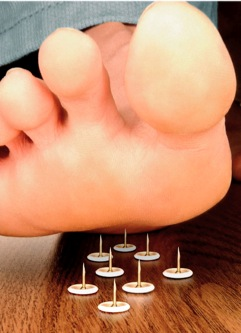Peripheral neuropathy (PN) describes damage to the peripheral nervous system, the vast communications network that transmits information from the brain and spinal cord (the central nervous system) to every other part of the body.
From the Desk of Dr. Karl R.O.S. Johnson, DC.....
Dr. Karl R.O.S. Johnson, DC
Recent Posts
Two Reasons Why Most Peripheral Neuropathy Treatments Fail
Posted by Dr. Karl R.O.S. Johnson, DC on Sat, Dec 10, 2011
Topics: peripheral neuropathy
Gluten Free, Casein Free, Soy Free Recipes Help with Autoimmune Illness
Posted by Dr. Karl R.O.S. Johnson, DC on Sun, Dec 04, 2011
Want to lose weight, become healthier and mitigate or prevent autoimmune processes in your body? These goals are foremost in my mind and I know they are for those who seek care at my office. For the last several years - ALL the patients who have found their way to my office have an autoimmune disorder - and ALL have either a gluten intolerance gene or two, a celiac gene, or both.
Topics: autoimmune, gluten free, recipes, gluten intolerance, Hashimoto's diease
Gluten Intolerance, Elevated Liver Enzymes and Liver Damage
Posted by Dr. Karl R.O.S. Johnson, DC on Sun, Nov 20, 2011
You may not know you have gluten intolerance - but you should be highly suspect if you have elevated liver enzymes.
Topics: Cyrex Labs, gluten, gluten intolerance, celiac, liver, elevated liver enzymes
Blood Type Friendly Gluten-Free Thanksgiving Meal Recipes - FREE
Posted by Dr. Karl R.O.S. Johnson, DC on Wed, Nov 02, 2011
Want to continue your health supporting lifestyle and plan a GREAT Thanksgiving dinner that is friendly for all blood types and gluten free? Look no further. You can click on the link below to download the D'Adamo approved Thanksgiving feast.
Topics: gluten free, D'Adamo, BTD, Blood Type Diet
Spinal Fusion Surgery Results in Worse Outcomes than Non-Surgical Treatments in Patients with Back Injuries
Posted by Dr. Karl R.O.S. Johnson, DC on Mon, Oct 31, 2011
A study* published in the February 15, 2011 issue of Spine, shows that spinal fusion surgery in patients with chronic low back pain leads to worse long-term outcomes – including a lower rate of return to work – compared to non-surgical treatment.
In this study the researchers compared 725 lumbar fusion cases to 725 randomly selected controls selected from a pool of workers’ compensation patients with chronic low back pain who underwent non-surgical conservative treatment such as physical therapy, exercises, etc. Final treatment outcomes included return to work, disability, and use of strong pain medications at two years follow-up.
In nearly all outcome categories it was worse for patients who had spinal fusion surgery. Only 26% of the spinal fusion patients returned to work after 2 years compared to 76%of those under conservative treatment. Also, 27% of patients in the surgical group had repeat surgery while 36% experienced some type of complication.
Eleven percent of the surgical patients had permanent disability, compared to 2% of the non-surgical patients. Most spinal fusion patients continued using opioid drugs after surgery with many taking higher doses. There were also more deaths in the spinal fusion group. The average days off work was greater for the surgical group compared to the non-surgical group (1,140 days off vs. 316 days off).
At a time of continued controversy over the role of spinal fusion surgery and the fact that this procedure has increased exponentially over the last decade despite lack of evidence that it improves patient outcomes, the results of this study raises questions about the long-term effectiveness of spinal fusion surgery.
Lead researcher Trang H. Nguyen, MD who practices occupational medicine in Cincinnati, Ohio, and his co-researchers write, “This [spinal fusion surgery] is offered to improve pain and function, yet objective outcomes showed increased permanent disability, poor return to work status, and higher doses of opioids.” They also note the lack of evidence supporting the use of spinal fusion for degenerative disc disease, herniated discs, of radiculopathy – the diagnoses present in most of the workers in the study. Their conclusion is that spinal fusion should be “cautiously considered” in workers’ compensation patients and then only for patients with diagnoses for which spinal fusion has proven specifically effective.
*Nuyen T, Randolph DC, Talmage J, et al. Long-term Outcomes of Lumbar Fusion Among Workers’ Compensation Sunjects: A Historical Cohort Study. Spine Feb 15, 2011; 36(4):320-331
Topics: low back pain, spinal fusion, back surgery
Patient Centered Multi-Disciplinary Spine Care Pathway Results in Minimized Lower Back Pain and Treatment Costs
Posted by Dr. Karl R.O.S. Johnson, DC on Mon, Oct 31, 2011
The use of a patient-centered multi-disciplinary Spine Care Pathway (SCP) helped to minimize lower back pain (LBP) and the associated treatment costs, according to a recent study, “A Hospital-Based Standardized Spine Care Pathway: Report of a Multidisciplinary, Evidence-Based Process,” published in the Journal of Manipulative and Physiological Therapeutics, February 2011, Vol. 34, No. 2.
Using the National Center for Quality Assurance (NCQA) Back Pain Recognition Program (BPRP) as its framework, the SCP provided patients with the five care options cited as the most effective in the back pain literature: spinal manipulation, extension and flexion directional preference exercises, core stabilization exercises, and mechanical traction.
“Lower back pain is a common condition affecting an estimated 90 percent of the population at some time,” said Ian C. Paskowski, D.C., lead author and medical director, Medical Back Pain Program at Jordan Hospital, Plymouth, Mass., the site from which this study’s date was derived. “Current methods of relieving LBP are often uncoordinated, inefficient and expensive. However, our team of researchers was the first to implement an evidence-based, standardized SCP, which aligned individual patients with the appropriate conservative care option. As predicted, the results were improved patient health and satisfaction rates, with decreased costs.”
The LBP program at Jordan Hospital, managed chiefly by Doctors of Chiropractic, treated 518 patients in the first six months of the program, using a two-tiered clinical management approach. Of the total patient population, 402 were exclusively cared for by D.C.s who achieved successful treatment outcomes in an average of just 5.2 visits at the extremely low cost of only $302 per case, while maintaining a patient satisfaction rate above 95 percent. Self-reported pain and disability scores were reduced by about 70% over the course of just a few weeks.
Primary Care Physicians (PCPs) have traditionally been the providers to initially see LBP patients. “We have demonstrated that when this spine care pathway is offered to PCPs, they will utilize these evidence-based guidelines and chiropractic services,” said Paskowski. “I largely credit our Doctors of Chiropractic for achieving these excellent clinical outcomes and attaining such high patient satisfaction rates. Their dedication to individual patient needs and a patient-centered approach aligns flawlessly with the medical home model and yields remarkable results. We anticipate that this SCP will become the globalized framework for uniformity and consistency in healthcare for LBP management, and that chiropractors will become the non-surgical spine care experts in the health care system.”
Topics: low back pain, multi-disciplinary, spine care pathway, back pain, chiropractic, spine
New Research Shows Eating Dried Plums Helps Prevent Fractures and Osteoporosis
Posted by Dr. Karl R.O.S. Johnson, DC on Mon, Oct 31, 2011
When it comes to improving bone health, a Florida State University researcher has found a simple proactive solution to help prevent fractures and osteoporosis – eating dried plums. The study, titled “Comparative effects of dried plum and apple on bone in postmenopausal women,” was published in the August 2011 issue of the British Journal of Nutrition.
“Over my career I have tested numerous fruits, including figs, dates, strawberries and raisins and not one of them come anywhere close to having the effect on bone density that dried plums, or prunes have,” said Bahram H. Arjmandi, Florida State’s Margaret A. Sitton Professor and chairman of the Department of Nutrition Food and Exercise Sciences in the College of Human Sciences. “All fruits and vegetables have a positive effect on nutrition, but in terms of bone health, that particular food is exceptional.”
Arjmandi and a group of researchers from Florida State and Oklahoma State University treated two groups of postmenopausal women. Over a 12-month period, the first group, consisting of 55 women was instructed to consume 100 grams of dried plums (about 10 prunes) each day, while the 2nd group, a comparative control group of 45 women, was told to consume 100 grams of dried apples. All the participants also received daily doses of calcium (500 milligrams) and vitamin D.
The researchers found that the group that consumed dried plums had higher bone density in the ulna and spine, in comparison to the control group that ate dried apples. This, according to Arjmandi, was due in part to the ability of dried plums to suppress the rate of bone resorption, or the breakdown of bone, which tends to exceed the rate of new bone growth as people age.
Topics: osteoporosis, prunes, bone health










